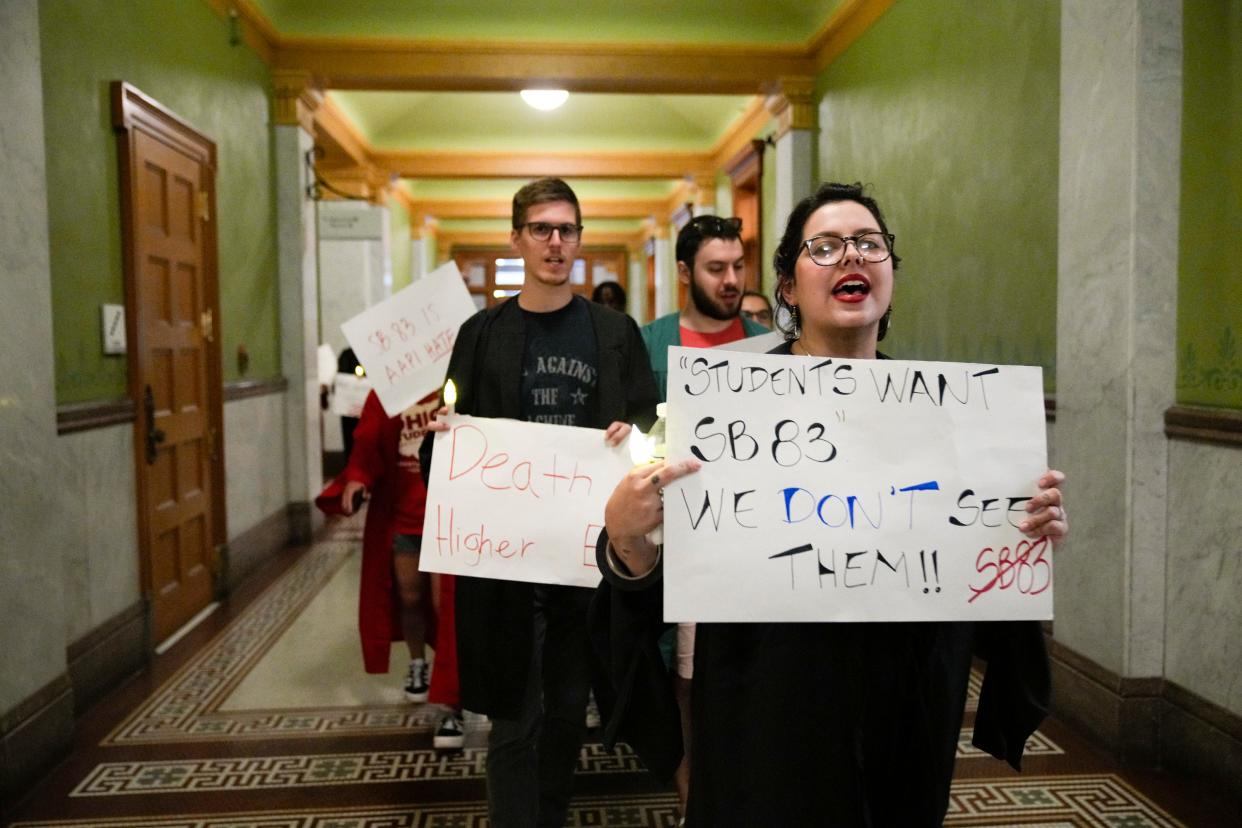Ohio higher education overhaul won't pass this year. What could happen next?

A controversial Ohio higher education overhaul that would ban mandatory diversity, equity and inclusion programs and weaken tenure won't become law this year.
Senate Bill 83 is at the center of a power struggle between Republican leaders in the Ohio House and Senate and their visions for what's best for the state's colleges and universities. That political tug-of-war has delayed the bill, which won't get a key vote this week.
Senate President Matt Huffman, R-Lima, backs the changes. "I think we're starting to, unfortunately, see some of the effects of some of those bad policies in higher education. You can read about that nationally. It's not just here in the state of Ohio," he said Wednesday.
But Ohio House Speaker Jason Stephens, R-Kitts Hill, told reporters Tuesday that he prefers not to rush transformative legislation. He's keeping an eye on congressional hearings where university presidents faced widespread backlash for refusing to say whether calls for the genocide of Jews would violate school anti-bullying policies.
Stephens said it's important to strike a balance between addressing that issue and protecting free speech. "We also want to make sure we're not over-addressing things," Stephens said. "The First Amendment is important."
Why are Ohio GOP lawmakers worried about higher education?
The proposed legislation is a reaction to the conservative belief that colleges and universities are imposing liberal philosophies on students to the detriment of true intellectual diversity. The bill's sponsor Sen. Jerry Cirino, R-Kirtland, says the changes are needed to attract faculty and students to Ohio.
However, Florida passed similar legislation, leading to an exodus of faculty at several universities, the Chronicle of Higher Education reported. One Florida A&M professor described the changes there as "an intellectual reign of terror" in an American Association of University Professors report.
In Ohio, opponents of the bill worry Senate Bill 83 will hamstring professors' ability to teach controversial subjects. And they question the underlying premise that professors are forcing liberal ideas on students.
One survey found that 10% of students felt pressure to align with their professors' political ideology. Conservative students were more likely to feel that pressure. Of those students who felt pressure, about half did change their political leanings − 29% said they became more liberal and 21% said they became more conservative.
"The reality is, however, that most student complaints with free speech undertones are unsubstantiated, and institutions are capable of distinguishing between perceived and actual bias," Stephen Mockabee, a University of Cincinnati associate professor of political science, told lawmakers.
What is in the bill?
Senate Bill 83 would:
prohibit mandatory diversity, equity and inclusion programs on campus.
ban universities from endorsing or opposing "any controversial beliefs or policies." Students would not be required to endorse any ideology, political stance or view to obtain a degree.
require student evaluations and faculty reviews, including questions about whether professors provided a classroom atmosphere free of bias.
require each class to post its syllabus online for students and the public to see.
limits collective bargaining on faculty reviews and retrenchment, which happens when courses are eliminated or reduced based on dwindling enrollment.
require an American history or government course that reviews the Constitution, Bill of Rights and other documents to graduate. Students could receive an exemption.
Will these changes become law?
Last week, Senate Bill 83 narrowly passed out of committee in an 8-7 vote. Democrats and two Republicans on the committee voted against the bill. Rep. Gayle Manning, R-North Ridgeville, voted for the bill despite initially opposing it. Manning said she changed her mind after anti-union language prohibiting strikes was removed.
Rep. Joe Miller, D-Lorain, said the bill was bad for Ohioans and condemned the process of passing as autocratic.
"Just because we took crap and put it in a chicken sandwich, it's still crap," Miller said. "I'm not eating it and neither should the people of Ohio. This bill is still bad. It needs a lot of work."
Wednesday marked the first opportunity for the bill to get a full House vote, but it wasn't on the agenda. "It still has some conversations that need to be had around it," Stephens said of the bill.
Stephens told reporters last month that the bill didn't have enough support to pass, but fellow Republicans dispute that. "I feel confident they're there," Rep. Tom Young, R-Washington Township, said last week. "We'll see. You never know. It's very fluid."
The bill's opponents are glad for the reprieve, even if they know the fight isn't over.
"In its current form, the bill would cause irreversible damage to Ohio higher education, and we are grateful that House leadership is taking the legislation seriously," said Sara Kilpatrick, executive director of the Ohio Conference of the American Association of University Professors. "Ohioans across the political spectrum have sent a clear message that this bill is bad for students, bad for workers, bad for higher education and bad for Ohio."
Reporter Haley BeMiller and USA TODAY contributed to this article.
Jessie Balmert is a reporter for the USA TODAY Network Ohio Bureau, which serves the Columbus Dispatch, Cincinnati Enquirer, Akron Beacon Journal and 18 other affiliated news organizations across Ohio.
This article originally appeared on Cincinnati Enquirer: Ohio higher ed overhaul won't pass this year. What could happen next?

